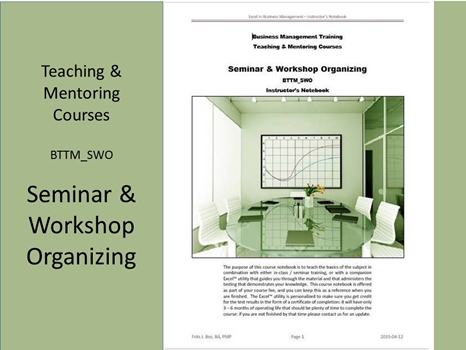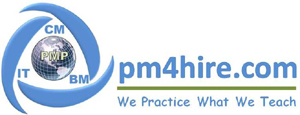
Seminar & Workshop Organizating Skills BTTM_SWO
Even if you do not see yourself as capable of standing in front of a room full of people to deliver a seminar, or a workshop, that does not mean you cannot be an active participant in the process of organizing events and hiring a presenter to do the actual delivery for you. From experience we know it takes effort, and familiarity with local facilities, to get everything arranged so that you can actually put on a seminar. There are ways to achieve that with low risk and low investment, but with potentially high returns on investment after you have paid for the facilities, the food, and the course presenter. If you feel dissatisfied with the lack of events in your community this course will step you through the typical scenarios for how you can put on an event of your own.
A successful seminar depends on understanding the audience and their willingness to pay a fee for attending the event. For a seminar to attract attendees topics must be relevant to what the audience is interested in, not merely what you feel like presenting: your audience wants to come away from a program with a sense of benefits gained so that they could become a future audience for your more advanced seminar programs (and gladly pay for it). Sometimes people select based on curiosity: it is better to spend money on a seminar than to change careers only to discover you made a mistake. As a commercial seminar producer you compete with associations that sponsor seminars not-for-profit (their entrance fees are lower compared to a for-profit commercial seminar), but they depend on volunteers that still need to learn how to plan and organize a seminar in order to make it successful (and not loss-producing).
Winning programs fill wants: they may teach how to build wealth, how to become richer, happier, or more attractive, motivated, or successful. Even people who do not need these things want this badly enough to pay money to learn how to reach that. Specialized subjects like project management skills enrichment fall into a category of seminars aimed at a very selective audience. The opportunity to make a profit depends on your ability to generate revenue by delivering value that people can appreciate. This can very well be something you are personally thrilled about – if you think that you have the ability to excite others about a favorite topic you have the foundation for a seminar that can potentially be profitable. Commercial seminars can be extremely lucrative (we will show how to in our examples), and you can even organize them in attractive get-away locations and/or link them to corporate events where you can present.
Unless you use materials already prepared by someone else you need to work out the contents of what you are going to present. In essence, you will be writing a catalog on the subjects, based on what different topics speakers can present that collectively fit the model you have in mind for your audience. The guide is simply a reference manual and brochure: it does not have to be a great novel so long as it helps you to sell the ideas to a prospective client base. You may also build a PowerPoint slideshow that allow you to cover the program in a way that lets you deliver the full scope of your program in the time allowed for that presentation.
Whether you develop subjects or use materials already prepared by someone else, you need to work out how each day will be scheduled to make sure you have enough time to cover all the material. For each seminar session establish an hourly schedule. If you set out to develop a packaged seminar you may want to create it with multiple presenters in mind so that a given program can be delivered in many different locations. Once you have outlined your seminar you need to commit to a date and advertise your event. You also must be prepared to accept registrations. Make sure someone answers the phone professionally, and that they are knowledgeable about the program, speaker, and company. You can also setup on-line registrations via your website: this reduces the risks of errors in the registration process.
Private seminars require the use of a “promo kit” that you send to prospective companies or associations. You can link this information to a website for further details, and focus on the benefits of the prospective client (arrange a seminar for employees or membership). This ensures that prospecting targets and active prospects can find you through the internet, and have access to the same information: if you update your information, they will see the latest version when they look for details. You can even use that in a version of your “promo kit,” when you try to get free publicity for what you are trying to do.
Use a version of this kit to get free publicity through print media (that are always looking for items to fill a magazine), or local interest radio or TV stations. There never is a guarantee that people will run with the kit, but if your effort is generic for a large prospect population, it is worth the potential benefit of people reading an article that mentions the seminar (and link to your website). Media potentially can make your credibility soar: people assume that being mentioned in a news article means you are pre-qualified as an expert that is worth listening to. You can enhance that image by writing guest articles for selected media.
Making arrangements to book the event means that you have to commit to certain costs up front – you may be an optimist (a good quality if you want to get anywhere in life) but you must provide contingency plans for cancellation without penalty (or at a minimal cost), or to partner with a sponsor to guarantee a seminar program in return for a cut of the profits (if any). We will review how to plan for managing that risk by keeping track of cancellation dates for reservations, or how to establish refund privileges in case your plans do not result in a successful production.
Once a seminar is well established those risks will be minimal, until then you simply have to set a minimum attendance level above your break-even point. Break-even attendance commitment levels are the absolute rock-bottom attendance levels to not operate at an outright loss. This includes the minimum fees payable to the presenter and other people that want to have their costs covered before they look at making a profit. We will look at how we can use early registrations to gauge your risk of funds committed, which can give us an early warning when to consider canceling the event to avoid the risk of operating at a loss. When you should reflect the specific costs is when they become non-refundable, and part of the sunk costs, if at any time thereafter you should consider the only option to be canceling the event. We normally look to a 50% buffer above those break-even levels.
Dealing with hotels or other venues can be frustrating: you should arrive early, to make sure the room is ready, and arranged as you requested, for the correct number of confirmed registrations. Make sure all equipment is in good working order, and that supplies are provided as arranged: at least you might get broken equipment replaced before the seminar starts. While you can rent some of the equipment, like a multi-media projector, screen, overhead projector and flip chart + easel, it is useful to consider what it costs to invest in your own equipment, in case you deliver presentations at venues where prerequisite equipment is not readily available. That does not mean you should rush out and invest in the equipment, but to consider if, and at what point in your seminar business development, it makes sense to be ready and loaded at a moment’s notice.
If you are planning to use the equipment regularly, then it can make sense to have everything on-hand, or even to have your own equipment available for backup in case something goes wrong with rented equipment. This is something you may want to invest in if you put on smaller presentations. For large rooms, the venue usually has the right size of equipment to clearly project visuals, so the audience can see what you are speaking to, no matter how far back they sit in that room. The easiest approach is for the promoter to find a local supplier to rent equipment from so that there is less risk that any equipment might be damaged while you travel to the meeting venue. Many venues supply the equipment at no extra cost or for a minimal fee: free or low-cost venues, on the other hand, generally expect you to bring your own or rent the equipment from a 3rd party.
The most important objective is to make a seminar profitable if possible. In this session we use an Excel™ model to explore your seminar objectives with a basic structure for a seminar production budget that shows a single venue, but you can substitute different venues, and/or a variable number of registrants, to illustrate the combined effects of fixed and variable costs. There are different ways to finance seminars – some presenter/promoter seminars are financed with a credit card or line of credit.
Ideally you work with a sponsor who can guarantee the costs of a seminar in return for a percentage of the profits. Some programs are multiple days in duration so that means a significant increase in costs. Carefully calculate worst-case scenarios, to make sure there is every opportunity to turn positive net revenue. In this session we will go through the detailed planning process, to simulate different “What If” scenarios, and to explore the potential of a seminar program to become a highly profitable opportunity.
Learning Formats BTTM_SWO
This course is currently available in a classroom setting (public or company private) with approximately 15 contact hours.
PDF – Certificate Of Completion
Each course offers a certificate of completion that identifies the course, the student, and a brief description of the course. To receive a certificate the student must have attended at least 80% of the course sessions. This personalized certificate is forwarded to the student by Email.
PDF – Course Notebook
Each course includes a notebook in PDF format that provides the minimum knowledge the student must master in order to obtain the certificate. In the notebook you will find references to other study materials. Students receive the notebook by Email when their registration is confirmed.
PDF – Program Overview
An overview of this study program can be downloaded from the website by right-clicking on the program link on the enquiry page.
PDF – Current Training Schedule
A list of upcoming training sessions can be downloaded from the website by right-clicking on the schedule link on the enquiry page.
Registration – Service Providers
To register for any training course please look on the enquiry link page of your service provider (from where you accessed this website). On the page you will find a registration request form where you can order the course that you are interested in. The availability dates will be provided to you, along with payment instructions if you decide to go ahead.

 |
|